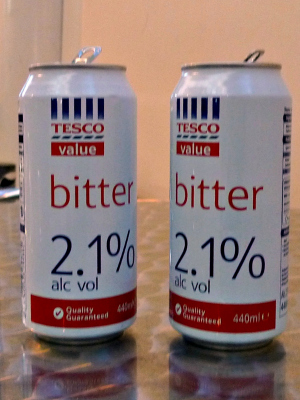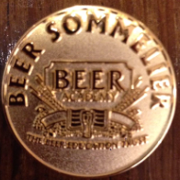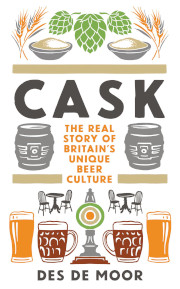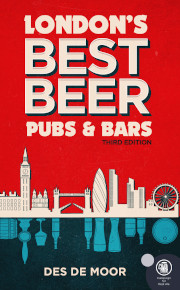My original intention was to use this blog to archive pieces that previously appeared elsewhere. I’ve stalled a little in implementing this plan, but now is the time to return to it. I’m starting with this piece which first appeared over ten years ago, in the November 2005 issue of BEER, back then a tabloid-style insert within What’s Brewing. Although I’d contributed bottled beer reviews to WB since 2002, this was the first feature I was commissioned to write about beer, and I’m grateful to then-editor Ted Bruning who asked for it.
I haven’t attempted to update it, but left it as a reminder of how much has changed in not much more than a decade — or not. Despite the ‘craft revolution’, improvements in the beer offer of major supermarkets have been miniscule, though at least Oddbins has rediscovered beer, and with a vengeance. Though Fabeers, livingbeer.com and Only Fine Beer have gone, specialist retailers now proliferate, including those offering curated cases. And I’m glad to say Beers of Europe and Beer Ritz are still very much with us. The upward trend of bottled beer’s market share has certainly persisted: in 2015 it topped draught for the first time in the UK, and is currently around 51% of overall volume.
In Mike Leigh’s classic TV play Abigail’s Party, monstrous hostess Beverly dispatches her weedy husband Laurence to fetch “light ales and lagers” for their little social gathering, thus pretty much summing up the choice for home beer drinkers back in 1977. Those were the days when over 80% of beer was drunk in pubs, and domestic social events were the only respectable justification for a carry-out. Brown ale and barley wine might have been on offer too, though these would have been far too déclassé for the pretentious Laurence.
How times change. Against a trend of overall decline in beer sales in the UK, off-trade sales now stand at 40% and rising. Off-sales have been driven mainly by the big supermarkets with their price cutting and marketing clout. As a beer enthusiast living in inner city south London, with branches of Tesco, Sainsburys, Asda, Morrisons and Waitrose within easy reach, I should surely be spoilt for choice. So why do I still feel disappointed with supermarket beer? And what are the alternatives?

Brand value? Tesco Value Bitter. Pic: Ewan Munro, Wikimedia Creative Commons.
Supermarket beer ranges look dazzlingly extensive at first glance but on closer inspection turn out to be rather restricted and predictable. Much of the shelf space is taken up by mass market multipacks, and while I confess to having a morbid interest in 2.1% ABV Tesco Value Bitter at 51p a litre, it’s not the sort of thing you’d want to match with Rochefort 10 in a comparative tasting.
More space is now given over to British speciality ales, but often from the same usual suspects: Greene King, W&D, Wychwood, Badger, Fullers and the like, most likely filtered and/or pasteurised. The lack of a varied range of British real ale in a bottle continues to dog supermarket beer listings: the few you will find are the same old strong pale ales, with imported beers like Hoegaarden and Duvel sometimes making up more than half of the live yeast quotient.
Sainsbury’s are about the best of the big chains at the moment thanks to a bigger than usual real range and their support for the likes of Meantime, though sadly their “CAMRA says this is Real Ale” shelf tags always seem to be placed in front of filtered beers. Tesco might be the biggest chain but they’re now arguably the most disappointing for beer hunting. Their beer challenge has a fine track record of lauding imaginative specialities, though few seem to survive beyond their initial guaranteed listing period.
Waitrose don’t do badly, though most of their real beers are imports like Anchor Steam and Westmalle. Asda have some less common BCAs and a few filtered specialities that are worth drinking. Safeway’s formerly impressive range is much reduced since it was swallowed up by Morrisons: the latter has just launched a new range of imported specialities although these are mainly InBev and ScotCo brands. The Coop commissions beers from Freeminer with exemplary labelling, but the selection is often small. And Booths is still supermarket beer heaven if you’re lucky enough to live in northwest England, but my nearest is 188 miles away.
If this seems like carping, you only have to look at the next aisle to see what things could be like: vast metres of wine from all over the world, from bargain basement to Grand Cru Classé, with grading systems, food matching suggestions and detailed tasting notes. And you can bet there’s not an Aussie fizz mislabelled as a champagne amongst them.
Since Oddbins lost interest, high street chains are now even less inspiring than supermarkets for beer hunters. Specialist beer shops are even less accessible to most of us than Booths. And while good local beer is popping up increasingly at farmers’ markets and delis, the range and variety here is self-limiting. So where to turn?
The answer is, as they say, merely a mouse click away: internet mail order has made it viable for specialist suppliers to reach a significant but scattered clientele of dedicated enthusiasts. At least half a dozen reliable websites allow you to hand pick bottles from an extensive selection which are delivered securely packed for a charge of around a fiver a case.
Only Fine Beer offers one of the biggest ranges on the web. Owner Gavin Preston took over a neighbourhood off license in East London in 1995, and started stocking then-rare Leffe. Customers asked if he could get other Belgian beers too, and eventually obscure Wallonian craft brews crowded out the cans of Stella and packets of fags. Gavin started selling on the web in 1997. The shop moved from London to Chelmsford in 2003 but it’s now the tip of a mail order and internet sales iceberg.
A range of around 1,100 lines majors on Britain, Belgium and Germany. There are plenty of BCAs from small British independents, and the Belgian choice has gone way beyond Leffe, with some classy lambics and even the rare Westvleteren trappist brews. The German selection is better than most you’ll find in Germany.
These are joined by serious beers from several other countries, artisanal ciders and perries and what Gavin calls “holiday beers”, pale international-style lagers of little interest to most CAMRA members but eagerly sought after by people hoping to recapture the taste of a favourite destination. He’s had the occasional email from beer snobs complaining about these, but they’re a major part of the business: lines like the Greek Mythos sell by the caseload and help make it possible to keep the more connoisseur-friendly beers. Customers are becoming more discriminating but, says Gavin, “they still baulk at high prices for beer and don’t see why they should have to pay for quality”.
Beers of Europe, now home of Britain’s biggest online range at 1400 lines, opened in 2001, a combined warehouse and shop inspired by the big beer supermarkets of mainland Europe. The website arrived soon afterwards but the shop still accounts for a good third of the turnover – surprisingly for somewhere tucked away down a country lane in a village just outside King’s Lynn. “Some people make us their excuse to have a holiday in Norfolk,” says owner Derek Clark.
Again Britain, Belgium and Germany are the mainstays but the range has expanded far beyond even the boundaries of Europe despite the company name. The choice is perhaps slightly less interesting than OFB but there are plenty of gems, including a good line in fine East Anglian BCAs, unfiltered Franconian lagers and a strong choice of hard-to-find French bières de garde. And there’s a list of holiday beers to do a travel agent proud.
Keeping such a big range means putting a lot of time into dealing with small brewers, not always the easiest occupation. “They’re the same breed as artists,” says Derek. “They’re not businessmen! But it’s usually worth having to chase an order a few times if the product’s good.” Their customers have always been a discriminating bunch, he says, and the good news is there are now more of them.
One hazard of web shopping is items going out of stock at short notice: with speciality lines in small quantities it’s difficult to predict sales, and someone unexpectedly buying three cases can clear the shelves. I like to pick my own mixed cases but I’m apparently atypical, since single beer cases are an important part of the trade: many drinkers find their favourites and stick to them, or let the supplier do the choosing by putting together preselected cases.
A few companies specialise in this case-based trade, including livingbeer.com which stocks only bottle conditioned British beers, with a list of over 100 beers that reads like a roll-call of the Good Bottled Beer Guide. At the moment you either have to order a case of each or go for one of owner Nigel Barker’s well-chosen, themed mixed cases, a limitation of the software the site uses.
Nigel, a former marketing man, was inspired by the pride the French take in their small wine producers on a visit to a Beaujolais chateau, and came back determined to do something similar for British beer. He sells entirely through the web, and wholesale to pubs whom he assists in mounting mini bottled beer festivals. Much of his custom comes from people, often women, buying mixed cases as gifts, and the recipient will often follow up by ordering a case of one particular favourite.
“It’s early days”, says Nigel, “but people are waking up to the fact that there’s more to beer than fizzy chilled stuff. To a certain extent that’s been driven by the supermarkets, even though their range is quite limited. But there are more and more brewers, and most of them are innovating, so it’s an exciting and dynamic time.” He says his policy of stocking as many British bottled real ales as he can find goes against the grain of the “less is more” philosophy that was drilled into him in his marketing days, but in a niche market customers appreciate genuine choice.
Many of the smaller specialist beer shops also have a web presence and will do mail order, although few run to full scale internet shopping: you can read their list online, but you’ll have to phone them up to make the order. One exception is Fabeers in York, with a range of around 700 including several small brewers from the north of England.
Vahe Nersessian opened his city centre shop in 1998, motivated by a personal interest in speciality beers acquired while living in Belgium. The website was added two years ago and though the shop is still the mainstay the internet trade is growing. It would grow faster, he says, if he could afford more advertising to promote it.
With seven supermarkets around the York ring road, Vahe wisely concentrates on a specialist market where expertise and the personal touch makes a difference: he could move to web sales and reduce his overheads with an out-of-town warehouse, but he’d lose the contact with customers. “Information is valuable”, says Vahe, after breaking off to give expert advice to customers on everything from strawberry-flavoured beers to German schnapps.
That personal interest and enthusiasm is something that drives all the specialist suppliers I spoke to: the challenge they face is retaining this and communicating it to the consumer while exploiting the economic advantages of the potentially impersonal world of internet sales. The personal touch is something that the supermarkets can’t offer, and something caring customers can appreciate and support. As Derek Clark says, “people who drink good beer are the salt of the earth – they tend to be nice people too.”






Leave a Reply